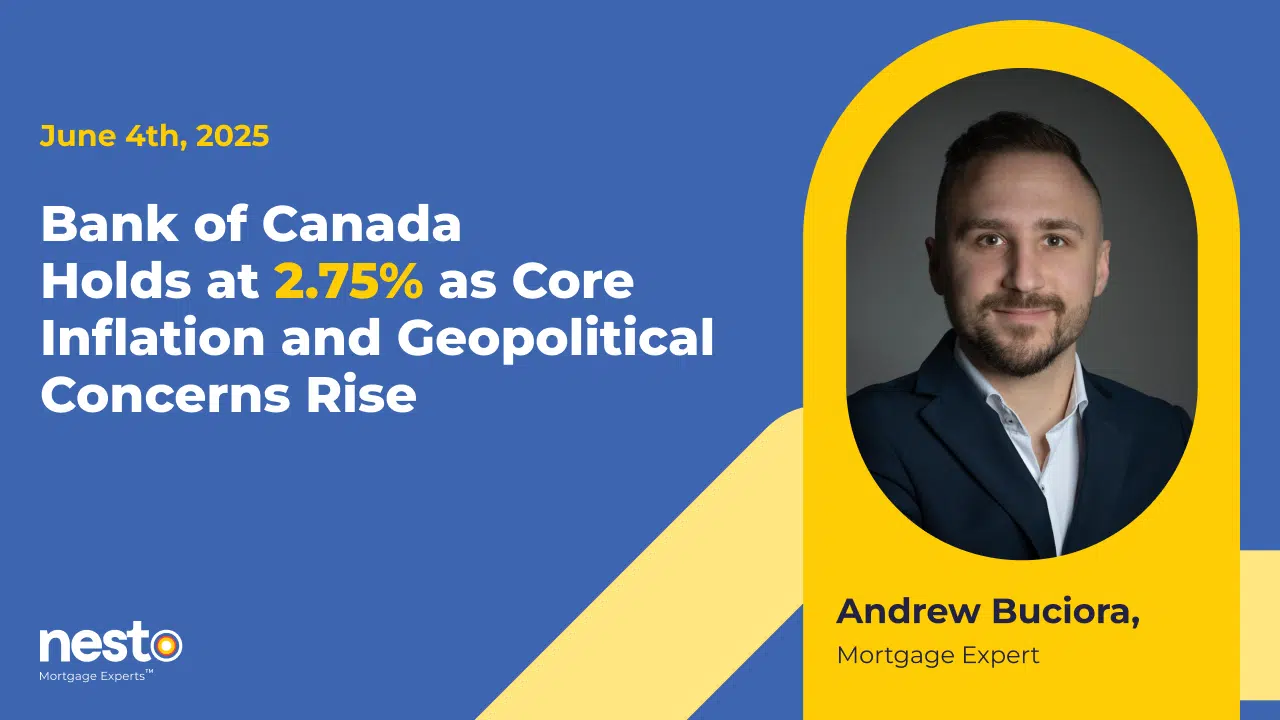Home Buying #Featured articles #Industry News
Home Buying #Featured articles #Industry News
Bank of Canada Holds Rates at 2.75% in June 2025 Amid Global Volatility

Table of contents
Bank of Canada Holds at 2.75% as Core Inflation and Geopolitical Concerns Rise
The Bank of Canada held its overnight rate steady at 2.75% on June 4, opting for caution amid volatile and mixed data. This decision keeps the nation’s prime rate at 4.20%. April’s headline inflation fell to 1.7%, but core inflation remained elevated. Food inflation rose to 3.8%, and the Bank’s preferred median and trim measures increased above 3%.
Long-term inflation expectations have continued to worsen in the US, with the University of Michigan 5-year inflation outlook temporarily spiking to 4.4%, its highest since 1991. This unexpected surge in long-term inflation sentiment spooked investors and deepened the feedback loop that is now pressuring global bond markets. While less dramatic in Canada, expectations are moving in the same direction.
Last week’s Q1 GDP came in stronger than expected at 2.2% annualized, primarily due to the front-loading of trade in tariff-targeted goods. But March’s jobs report showed a loss of 33,000 jobs and an unemployment rate of 6.9%, indicating growing stress beneath the surface. The Bank of Canada (BoC) acknowledged that headline economic data appeared stable, but underlying indicators suggested that household spending, business investment, and manufacturing activity were weakening.
“Look, uncertainty is bad for business. It’s bad for households. If you’re a business and you don’t know how much demand there’s going to be for your product, you’re obviously going to be much less [likely] to invest. Uncertainty delays investment, it makes households more cautious. So yes, that will tend to weaken activity. And yes, you’re seeing that in the Canadian economy.”
– Tiff Macklem, press conference opening statement
Bond markets reacted negatively to the escalation of US tariffs and erratic policy pivots. A false social media post temporarily triggered a market rally before being debunked, exposing extreme market sensitivity to trade news. Canadian yields jumped in sympathy with US Treasuries as investors sold off bonds, signalling deep discomfort with the policy path in Washington.
“The trade conflict initiated by the United States remains the biggest headwind facing the Canadian economy. Since our April decision, the U.S. administration has continued to increase and decrease various tariffs. China and the United States have stepped back from extremely high tariffs, and bilateral trade negotiations have begun with a number of countries. The extreme financial turmoil we saw in April has moderated and stock markets have recovered their losses. However, the outcomes of the trade negotiations are highly uncertain, tariffs are well above their levels at the beginning of 2025, and new trade actions are still being threatened. The recent further increases in U.S. tariffs on steel and aluminum underline the unpredictability of U.S. trade policy.”
– Tiff Macklem, press conference opening statement
The loonie strengthened as US dollar weakness persisted, helping Canada mitigate some import-driven inflation. However, this also put pressure on exporters. And with US fixed income losing its “safe haven” status, global capital flows may continue to disrupt Canadian bond pricing, keeping mortgage rates volatile.
The fixed mortgage market has already begun reacting. Several lenders signalled hikes, following surges in US bond yields. Canadian 5-year yields also moved higher in response to US Treasury volatility, reducing the potential for much short-term fixed-rate relief.

Why Holding Rates Now Made Sense
The BoC likely saw inflation follow-through risks from tariffs and April’s core CPI acceleration as a reason to wait. It also faced the reality that further cuts could stoke housing and asset inflation while doing little to address global supply-side shocks. Instead, the Bank leaned on its previous easing and opted for a wait-and-see approach while warning that flexibility remains if downside risks deepen.
“At this decision there was a clear consensus to hold policy unchanged as we gain more information. We also discussed the path ahead for the policy interest rate. Here, there was more diversity of views. On balance, members thought there could be a need for a reduction in the policy rate if the economy weakens in the face of continued US tariffs and uncertainty, and cost pressures on inflation are contained.”
– Tiff Macklem, press conference opening statement
Canada may be faring slightly better than the US in terms of inflation trajectory, with less dramatic tariff exposure and fewer disruptions to its global trade relationships. However, investors have begun to question the durability of US Treasuries as a safe haven, a trend that is now starting to spill over into Canadian financial markets.
“Looking forward, if Canada can get a renewed trade agreement with the United States that reduces uncertainty, the rules are clearer, and that has durability, I think that will help everybody get on with decisions … and you’ll see some rebound in activity that hasn’t happened yet. The prospect is there, the sooner that happens, the better. We’re certainly like everybody else, we’re watching announcements coming out of the White House very closely.”
– Tiff Macklem, press conference opening statement
What It Means for Canadian Mortgage Borrowers
- Fixed rates are likely to remain volatile, regardless of BoC decisions, as bond yields surge.
- Renewers should consider securing current rates before another round of hikes from lenders.
- Refinancers may want to act now if they need to tap into their home equity, as the timing of rates remains unpredictable.
Mortgage strategy in 2025 isn’t about guessing the next move. It’s about preparing for all scenarios. A rate hold signals patience, but it also highlights the Bank’s limited tools when global geopolitics drive inflation. With the Fed still cautious and Canadian data walking a tightrope, the safest play for borrowers is flexibility. Hybrid terms, shorter fixed options, and keeping a close eye on bond markets could be more critical now than ever.
Why the Bank Had to Pump the Brakes on Further Easing
The Bank of Canada would like to see its preferred inflation measures align precisely with its 2% target. However, in the real world, it needs to remain somewhere between 1% and 3% to maintain steady and predictable inflation. Currently, both of the BoC’s core inflation gauges are back above the 3% ceiling. That’s a red flag, and it leaves policymakers little room to offer more rate relief, even as economic cracks begin to show.
Across the country, the labour market has started to soften. Unemployment has ticked higher, and wage growth is slowing. According to economist David Rosenberg, fewer than 60% of Canadians who began job-hunting over the past year have secured employment.
Meanwhile, GDP growth in Q1 received a one-time boost from a surge in import and export activity as buyers rushed to beat looming tariffs. However, underneath the headline, both consumer spending and business investment stalled. Housing markets are also cooling, with sales falling even as new listings climb.
Signs of financial strain are surfacing, too. More Canadians are starting to miss debt payments on mortgages and other credit, and major banks are responding by increasing their reserves for potential loan losses. Confidence surveys from the Bank of Canada suggest that consumers and businesses are feeling increasingly cautious. Historically, these confidence dips often appear in the complex economic numbers shortly thereafter.
“The Canadian economy is showing some resilience to tariffs. Yes, consumption was softer in the first quarter. You can see the impact of tariffs on consumption. But, you know, despite a really big drop in consumer confidence, consumer spending did continue to grow in the first quarter, business investment was actually a bit stronger than we expected in the first quarter. So, you can definitely see the impact of tariffs. But you know, there is some resilience. Having said that, look, the longer these tariffs go on, the longer this uncertainty goes on, the more it’s going to weigh on the Canadian economy, the more that is going to put downward pressure on inflation. And we will be watching that very carefully. But we are also conscious that there are cost effects of tariffs. We’re seeing that already in the trade disruption.
What we’re hearing from firms is that the trade disruption is already adding costs. They’re looking for new suppliers. They’re developing new markets. That’s adding costs and the retaliatory tariffs put in place. That is not yet in the CPI data that we have. You will see that start to come in the months ahead. So we will be looking at both those things. And as I discussed in the opening statement in our deliberations, we did talk about the future path, and the Governing Council thought that there could be a need for a further reduction in the interest rate, if the tariffs continue, if that creates more weakness in the Canadian economy, and if the cost pressure is coming through inflation are contained.”
– Tiff Macklem, press conference opening statement
In another environment, all of this might have prompted a rate cut. However, the Bank has made it clear that it can’t risk fueling inflation when prices are already running high. Instead of looking ahead, the BoC is focused on the latest data, especially with unpredictable US tariffs making forward guidance nearly impossible. That’s why it held the line this week, even as parts of the economy could benefit from a boost.
How Bank of Canada Rate Changes Affect Your Mortgage Payments
For example, if you have a $500,000 mortgage secured at nesto’s 5-year variable low rate of
Common mortgage amounts and corresponding mortgage payments on nesto’s 5-year variable low rate of
June 2024 vs. June 2025: What’s Different?
How Has Housing Affordability Changed in the Past Year? Renting vs. Owning
Today, Canada’s benchmark home price is $701,800, while a year ago, it was $728,000, which has decreased by 3.5%. However, the lowest 5-year variable mortgage rate at nesto has decreased from 5.90% a year ago to
TL; DR— Canada‘s monthly mortgage payment decreased by 19.84%. Meanwhile, average home prices decreased by 3.5%, and average national rents have decreased by 2.3%. In dollars, mortgage payments have decreased by $737.46, average home prices have decreased by $26,100, and average national rents have decreased by $33.86.
*1 and 2: Values for mortgage payments calculated based on nesto’s variable rate over a 25-year amortization period with a 20% downpayment using the average/benchmark home price in the stated month as reported by CREA for the location.

How Bank of Canada Rate Changes Affect Your Mortgage Payments and Interest Costs*
June 2024
Fixed Rate: 4.69%
Home Price: $728,000
20% Downpayment: $145,600
Mortgage Needed: $582,400
→ $3,285.23 monthly mortgage payment
→ $127,635 in total interest over 5-year term

June 2025
Fixed Rate: 3.91%
Home Price: $701,800
20% Downpayment: $140,380
Mortgage Needed: $561,520
→ $2,926.38 monthly mortgage payment
→ $102,118 in total interest over 5-year term
June 2024
Variable Rate: 5.90%
Home Price: $728,000
20% Downpayment: $145,600
Mortgage Needed: $582,400
→ $3,716.90 monthly mortgage payment
→ $163,623 in total interest over 5-year term

June 2025
Variable Rate:
Home Price: $701,800
20% Downpayment: $140,380
Mortgage Needed: $561,520
→ $2,979.44 monthly mortgage payment
→ $106,787 in total interest over 5-year term
*For illustrative purposes only, when comparing against nesto’s 5-year lowest fixed and adjustable insured and insurable mortgage rates, with a 20% downpayment & 25-year amortization, using Canada’s composite average home price data as made available through CREA. Other limiting terms & conditions apply. Rates are subject to change without notice.
Borrowing in a Fast-Changing World
The Bank of Canada’s decision to hold its policy rate at 2.75% may feel like a pause, but it’s more of a hedge against future rate increases. While inflation appears to be easing on the surface, core price pressures remain persistent, and the ripple effects of US tariffs are far from over. At the same time, substantial GDP numbers mask weakness in labour markets and household spending. For now, the Bank is choosing patience over bold moves, but that doesn’t mean mortgage shoppers can afford to stand still.
For anyone navigating mortgage rate trends in today’s market, whether you’re buying, renewing, or refinancing, rate strategy matters more than ever. Fixed rates are rising again, variable discounts are shrinking, and bond markets are reacting more to global geopolitics than local data. That’s why working with a nesto mortgage expert can help you build a flexible plan that matches your budget, timeline, and risk tolerance.
Don’t guess your way through uncertainty. Get expert advice paired with a rate hold from a nesto mortgage expert and lock in the mortgage strategy that works for your unique circumstances.
Why Choose nesto
At nesto, our commission-free mortgage experts, certified in multiple provinces, provide exceptional advice and service that exceeds industry standards. Our mortgage experts are non-commissioned, salaried employees who provide impartial guidance on mortgage options tailored to your needs and are evaluated based on client satisfaction and advice quality. nesto aims to transform the mortgage industry by providing honest advice and competitive rates using a 100% fully digital, transparent, seamless process.
nesto is on a mission to offer a positive, empowering and transparent property financing experience – simplified from start to finish.
Contact our licensed and knowledgeable mortgage experts to find your best mortgage rate in Canada.















